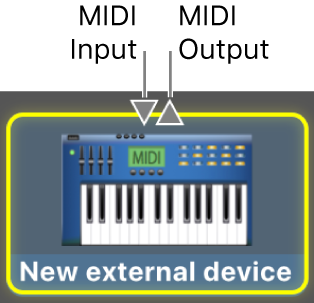
Set up MIDI devices using Audio MIDI Setup on Mac
If you use MIDI devices or a MIDI interface connected to your Mac, you can use Audio MIDI Setup to describe the configuration of your MIDI devices. There’s a default configuration already created, but you can set up your own.
You can use this configuration information for apps that work with MIDI, such as sequencers, to control your MIDI devices.
Connect your MIDI devices to your Mac.
If you’re using an interface device, connect any other MIDI devices you’re using to the interface. Make sure any software provided by the manufacturer of the MIDI devices has been installed. For more information, see the documentation that came with your devices.
In the Audio MIDI Setup app
 on your Mac, choose Window > Show MIDI Studio.
on your Mac, choose Window > Show MIDI Studio.If you have a MIDI interface connected to the USB port on your Mac, it should appear in the MIDI Studio window. If it doesn’t, see If a connected MIDI device doesn’t appear.
Click the Choose MIDI Configuration pop-up menu, then choose New Configuration. Give the new configuration a name, then click OK.
To add a new external MIDI device, click the Add external MIDI device button
 in the MIDI Studio toolbar.
in the MIDI Studio toolbar.Double-click the icon for the MIDI device to describe the device configuration:
You can give it a name and provide other information about the device. This name appears in apps you use with your MIDI device.
To change the icon, click it to open the Icon Browser.
To select settings for the MIDI properties and ports for the device, click More Information.
Click Apply.
Repeat steps 5 and 6 for each MIDI device you want to include in the configuration.
To specify the connection between MIDI devices, drag the output or input connectors above the device icon to the corresponding connector on the other device icon.

You can’t specify a “MIDI thru” connection between two MIDI devices. To indicate a MIDI thru connection, connect the two MIDI devices to the same port of the MIDI interface device.